WES for Canada PR in 10 Steps: Best ECA for Canada Immigration
Embarking on the journey to obtain Permanent Residency (PR) in Canada necessitates a thorough understanding and meticulous approach, with the Educational Credential Assessment (ECA) standing as a cornerstone requirement. World Education Services (WES) emerges as a beacon in this process, offering a comprehensive evaluation of your academic credentials to determine their equivalence within Canada’s esteemed educational framework. This pivotal assessment not only validates the authenticity of your educational qualifications but also plays a pivotal role in enhancing your eligibility profile for various Canadian immigration programs, such as the Federal Skilled Worker Program or the Canadian Experience Class.
Aspiring immigrants must undertake a structured approach encompassing ten pivotal steps to initiate the WES ECA process seamlessly. Beginning with a thorough review and preparation of essential documents, including academic transcripts and degree certificates, candidates navigate through creating a WES account, selecting the appropriate ECA application type, and submitting requisite fees. Throughout this process, maintaining proactive communication, monitoring application status, and promptly addressing any requests or clarifications from WES ensure a streamlined evaluation. Upon receiving the ECA report, applicants can strategically leverage this document within their PR application, underscoring the equivalency of their credentials and fortifying their position within Canada’s competitive immigration landscape. By aligning with WES’s esteemed reputation and adhering to these ten steps diligently, individuals poised to embark on their Canadian PR journey set a solid foundation, emphasizing their qualifications’ authenticity and aligning with Canada’s vision for skilled, talented, and diverse immigrants.
What is Canada Educational Credential Assessment & Why Do I Need it?
The Educational Credential Assessment (ECA) is a pivotal mechanism within the Canadian immigration landscape, providing a structured evaluation of foreign academic credentials vis-à-vis Canada’s esteemed educational benchmarks. This rigorous assessment is paramount for individuals navigating pathways such as immigration, higher education pursuits, employment opportunities, or the attainment of Permanent Residency (PR) status within Canada.
Canada’s dedication to rigorous academic standards necessitates a transparent and standardized method for evaluating international academic qualifications. The ECA fulfills this imperative by offering a comprehensive assessment, facilitating a clear understanding of the equivalency and relevance of foreign educational accomplishments within Canada’s educational framework. By undergoing the ECA process, candidates furnish Canadian immigration authorities, academic institutions, and prospective employers with a transparent evaluation of their academic credentials, thereby streamlining decision-making processes and fostering trust within the evaluation system.
The ECA embodies Canada’s commitment to transparency, equity, and excellence within its educational and professional sectors. By engaging with the ECA process, individuals affirm their dedication to aligning with Canada’s academic standards, enhancing their credibility, and fortifying their eligibility for integration into Canada’s dynamic socio-cultural and professional landscape. Thus, comprehending and navigating the ECA framework emerges as an essential step for individuals aspiring to carve a prosperous and meaningful pathway within the vibrant tapestry of opportunities that Canada offers.
How to Obtain Your Educational Credential Assessment (ECA) for Canada: A Comprehensive Guide
Obtaining an Educational Credential Assessment (ECA) for Canada requires a systematic approach, attention to detail, and adherence to specific guidelines. An ECA is a crucial document for individuals intending to immigrate to Canada, as it validates the equivalency of their foreign educational credentials with Canadian standards. Here’s a step-by-step guide detailing how you can secure your ECA:
1. Understanding the ECA Requirement
- Purpose: Recognize the significance of the ECA in demonstrating the equivalency of your foreign academic credentials within Canada’s educational system.
- Immigration Streams: Determine the specific immigration stream or program that necessitates an ECA as part of its eligibility criteria, such as the Federal Skilled Worker Program or Canadian Experience Class.
2. Choose a Designated Organization
- Authorized Agencies: Identify and select a designated organization authorized by Immigration, Refugees, and Citizenship Canada (IRCC) to conduct ECAs. Common organizations include World Education Services (WES), International Credential Assessment Service of Canada (ICAS), and Comparative Education Service (CES).
3. Gather Required Documentation
- Academic Records: Collect official transcripts, diplomas, degrees, and any other relevant educational documents from institutions attended outside Canada.
- Translations: Ensure that all non-English or non-French documents are translated by a certified translator recognized by Canadian authorities.
4. Create an Online Account
- Organization’s Portal: Register and create an account on the selected organization’s online portal.
- Application Form: Complete the requisite application form, providing accurate details and uploading scanned copies of your academic documents.
5. Submit Application and Fees
- Processing Fees: Pay the prescribed ECA evaluation fees.
- Document Submission: Submit your application and required documents through the organization’s portal.
6. Await Assessment Completion
- Processing Time: Monitor the status of your ECA application.
- Updates and Notifications: Stay informed about any updates or notifications from the organization.
7. Receive and Review ECA Report
- Evaluation Outcome: Upon completion, receive your ECA report.
- Review for Accuracy: Thoroughly review the ECA report for accuracy.
8. Leverage ECA for Immigration or Employment
- Documentation: Include the ECA report in your immigration application or employment verification process.
- Consultation: Consider consulting with immigration professionals or legal advisors.
9. World Education Services – WES
WES website: https://www.wes.org/
ECA Fees: 200 CAD for any number of credentials and 100 CAD for upgrade + Courier charges
Canada ECA Processing Time: 35 days from when all the documents are accepted.
WES Degree Equivalency Tool: https://applications.wes.org/ca/degree-equivalency-tool/
Use the WES degree equivalency tool to find out what your degree is equivalent to.
10. International Qualifications Assessment Service (IQAS)
IQAS Website: http://work.alberta.ca/immigration/international-qualifications-assessment-service.html
ECA Fees: 200 CAD for any number of credentials and 100 CAD for upgrade + Courier charges
Canada ECA Processing Time: 23 weeks from when all the documents are accepted.
11. International Credential Evaluation Service (ICES)
ICES Website: https://www.bcit.ca/ices/eca/
ECA Fees: 200 CAD for each credential.
Canada ECA Processing Time: 20 weeks from receiving all the documents.
12. Comparative Education Service (CES)
CES website: https://learn.utoronto.ca
ECA Fees: 210 CAD for each credential + Courier charges/Order for softcopy or free of cost for pickup at the University of Toronto office option
Canada ECA Processing Time: 90 days from when all the documents are accepted.
13. International Credential Assessment Service of Canada (ICAS)
ICAS Website: https://www.icascanada.ca/home.aspx
ECA Fees: 200 CAD for any number of credentials + Courier charges
Canada ECA Processing Time: 30 weeks from receiving all the documents.
14. Pharmacy Examining Board of Canada (PEBC)
PEBC Website: https://www.pebc.ca/index.php/ci_id/3116/la_id/1.htm#FSWP
ECA Fees: 100 CAD for any number of credentials + Courier charges
Canada ECA Processing Time: 8 weeks from the day all the documents are received
15. Medical Council of Canada (MCC)
MCC Website: https://physiciansapply.ca/services/educational-credential-assessment/
ECA Fees: 111 CAD for any number of credentials + Courier charges
Canada ECA Processing Time: 14 business days for the soft copy and 8 weeks for the hard copy from the day all the documents are received
Why WES is the Best ECA for Canada Immigration?
The World Education Services (WES) is often regarded as one of the leading credential evaluation services, particularly for individuals seeking to immigrate to Canada. Several reasons contribute to WES being considered among the best for Educational Credential Assessment (ECA) for Canada Immigration:
1. Recognized by IRCC:
- Official Recognition: The Immigration, Refugees, and Citizenship Canada (IRCC) recognizes WES as one of the designated organizations for ECAs, making its evaluations widely accepted for Canadian immigration purposes.
2. Expertise and Experience:
- Established Reputation: WES has a longstanding reputation for expertise and reliability in evaluating international educational credentials, with years of experience in the field.
3. Comprehensive Evaluation:
- Detailed Analysis: WES conducts a thorough assessment of academic credentials, providing a comprehensive evaluation that aligns with Canadian educational standards and equivalencies.
4. User-Friendly Process:
- Efficient System: WES offers an accessible and streamlined online platform for submitting documents, tracking applications, and receiving evaluation reports, ensuring a user-friendly experience for applicants.
5. Timely Processing:
- Prompt Services: WES is known for its efficient processing times, offering various service options, including expedited services, to accommodate applicants’ timelines and requirements.
6. Global Recognition:
- International Credibility: WES’s evaluations are recognized not only in Canada but also globally, facilitating international mobility and recognition of academic credentials across borders.
7. Dedicated Customer Support:
- Supportive Assistance: WES provides responsive customer support, offering guidance and assistance throughout the ECA process, addressing queries, and ensuring clarity for applicants.
8. Transparent and Reliable:
- Trustworthy Evaluations: WES maintains transparency, integrity, and reliability in its evaluations, adhering to established protocols and standards to deliver trustworthy assessment outcomes.
The steps to apply for an ECA for Canada on WES are listed below.
Step-by-step process of WES portal for Canada
1-Create an Account on WES Portal
Visit the official WES website to register an account. Because WES also performs ECA for the United States, be sure to select Canada as the nation for which you will use your evaluation.
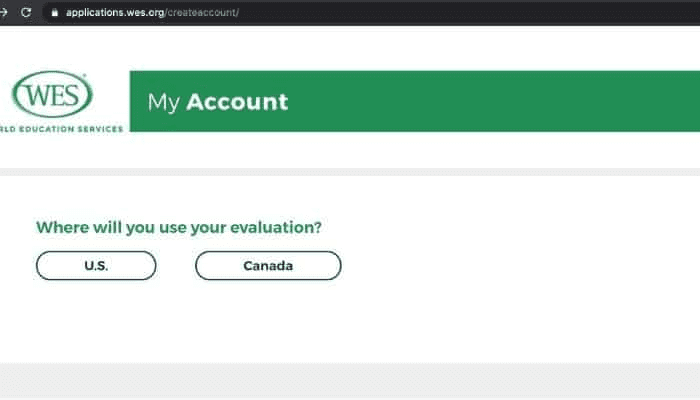
You would then be prompted to select the purpose after selecting Canada.
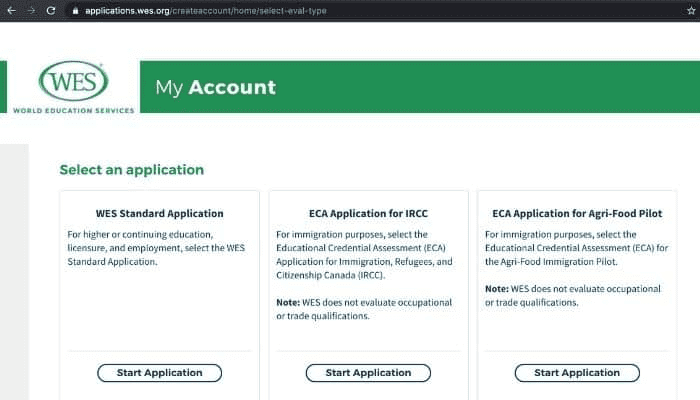
WES Standard Application
This is for those who wish to study in Canada and obtain a Canadian license. Therefore, you would require this if you wanted to apply for a study visa.
ECA Application for IRCC
People who want to immigrate to Canada through an express entry or the PNP route most frequently use this one. The government organization in charge of all of this is IRCC Canada. The majority of you would select this option.
ECA Pilot in Agri-Food Application:
This must only be used for the agri-food pilot project.
In my case, I clicked “Start Application” after selecting “ECA Application for IRCC.”
On the following page, you will be asked to enter your personal information, including your date of birth, before you can create an account.
*Using your reference number, you can contact WES through their Contact Us page and ask them to change the evaluation type if you made the payment after selecting the incorrect one.
2. Provide Mailing Address to World Education Services
When creating a WES account, enter your phone number and mailing address. WES will mail your ECA hard copy to this address. Although having a hard copy is not required, it can be helpful in many situations.
3. Provide Education for WES Evaluation
The most crucial step, where you must provide your educational information, is this one.
For an Educational Credential Assessment, IRCC Canada only requires applicants to submit their highest completed credential (ECA). However, Indians are exempt from this. The details are in the section on Indians.
If you have a Master’s and a Bachelor’s degree, you should have the Master’s evaluated rather than the Bachelor’s. But there is a proviso in this for some nations, like India.
You don’t need to evaluate the Bachelor if you hold a Master of Education, Engineering, Master of Philosophy, or Master of Technology in India. You do in all other situations.
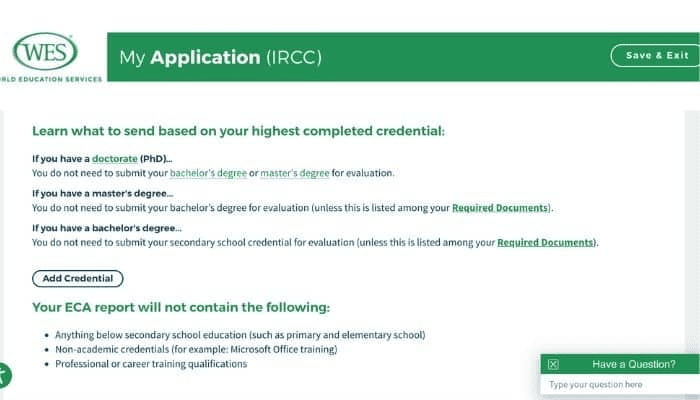
To add a credential, click the button marked “Add Credential.” Make sure you complete this step with your certificate in front of you to avoid any mistakes.
In my case, I only had a bachelor’s degree, so I went with that. I entered my name, the certificate’s name, the years I attended the degree, and my institution’s name.
You can manually enter your institute if it is not already included.
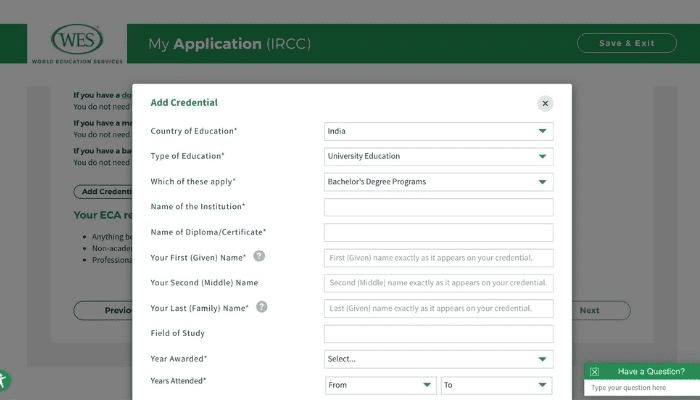
You can add any additional credentials after you’ve finished adding one. So you can also add the Master’s after adding the Bachelor’s. Most people typically select a university education first, followed by a bachelor’s, master’s, or doctoral degree. Depending on where you completed your education, there are different options for the type of education.
You would select “Higher Education” rather than “University Education” for many nations, including the Philippines, Sri Lanka, the United Kingdom, and the United States of America.
Name of Diploma/Certificate
The diploma or certificate’s title must match what is stated on your certificate.
Common examples:
-Bachelor of Technology
-Bachelor of Arts
-Bachelor of Philosophy
-Master in Business
-Master in Science
4. Confirm the Recipients for Credential Assessment in Canada
You can choose the recipients of the ECA after completing the educational information on WES for Canada. By default, WES would deliver the report on the evaluation of educational credentials to
-you, the applicant
-IRCC Canada, Immigration, Refugees and Citizenship Canada (IRCC)
You can now select more recipients from WES’s approved list if you’d like. You can choose, for instance, to have your ECA go to the New Brunswick Provincial Nominee Program. You can select from a variety of state governments as well.
Therefore, do include the program as a recipient if you intend to apply to a Provincial Nominee Program (PNP) in Canada. In any case, PNP recipients can be added later.
Once you confirm the list of recipients, you can see what all WES would provide, including:
-A PDF soft copy of the education evaluation for Canada immigration to you
-ECA report for IRCC Canada electronically
-Official paper report for you
-Electronic storage for your report
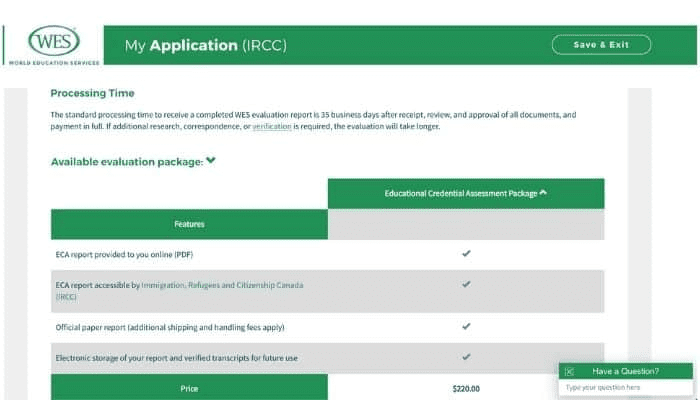
Following that, you can select Standard Mail via Canada Post or an international courier, including tracking. I recommend using Standard Mail because it is significantly less expensive, and the hard copy is not required again.
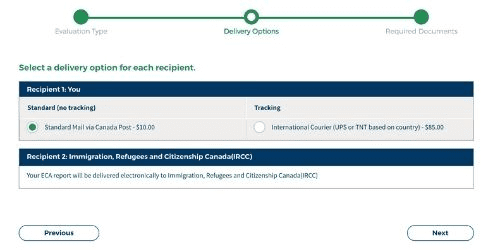
5. WES Requirements for Evaluation of Degree in Canada
For the WES evaluation in Canada, pay close attention to this page to understand exactly which documents are required and how they should be submitted.
The documentation needs and submission requirements will differ significantly depending on where you completed your education.
-You might or might not need to upload a copy of your certificate.
-You might be able to get the official transcripts from the university and courier them to WES in a sealed envelope.
-Your university would need to courier the official transcripts to WES, not you.
-Your university would email or send the transcripts electronically for WES evaluation, and there won’t be any need for the hard copies to be couriered.
*Students of many nationalities may send the official transcripts to WES on their own, in a sealed envelope, and in many cases, electronically.
Upload Degree Certificate
In “My Account,” upload a crisp, legible photocopy of the final or provisional degree certificate.
Send the Official Attested Transcripts from the University
The official transcripts are not marked sheets or result cards provided by the college. A certified transcript would contain
- All subjects/papers taken
- Marks earned for each year of study
- Your university student identification number.
- These documents would need to be authenticated by your university and sent directly to WES in a sealed envelope with the back flap stamped or signed by the appropriate university authentication officer.
- Ensure the documents are being sent via regular Mail or courier.
- Include the WES reference number you would receive following payment of the WES evaluation fees. Every envelope and piece of paper you send to WES must have this reference number.
- Sending original documents is not advised unless WES specifically requests them.
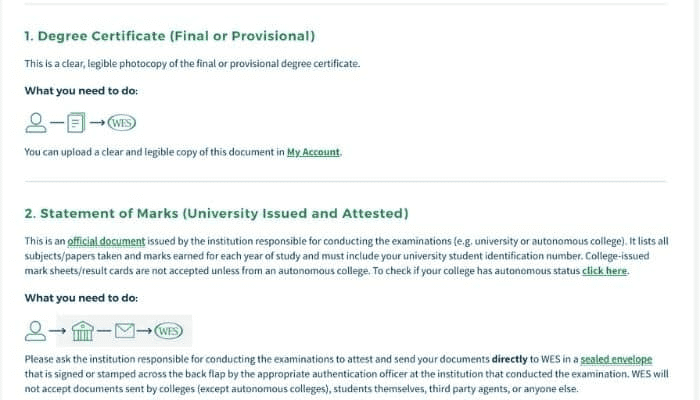
All paperwork needs to be mailed to WES. WES DOES NOT accept personally delivered documents. You can double-check your information and the WES evaluation costs before submitting your payment. It cost $230 CAD in my case.
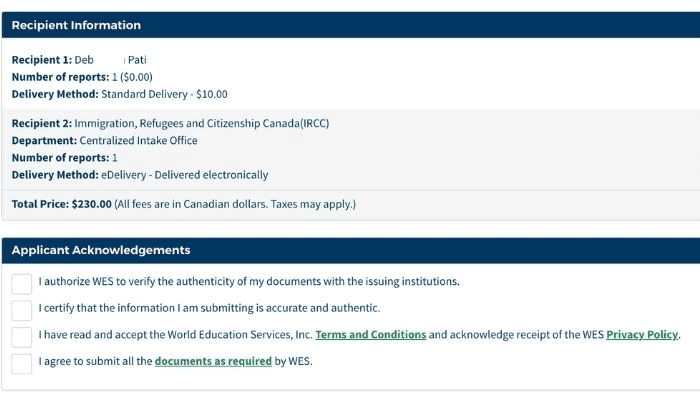
6. Pay WES Evaluation Fees
There are three ways to pay WES evaluation fees:
-Credit card
-Cheque/money order
-Western Union Money Transfer
Undoubtedly, using a credit card is the quickest method of payment.
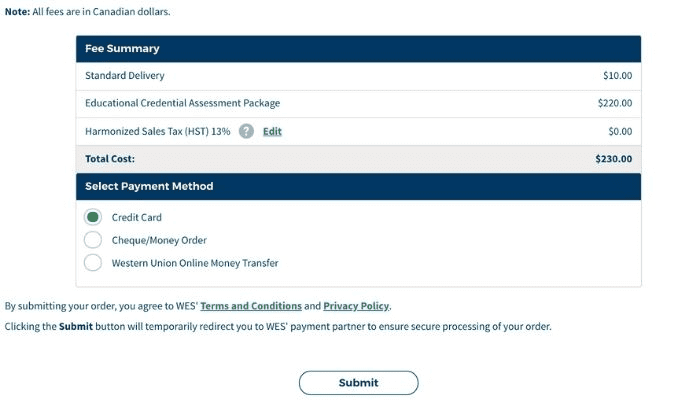
After submitting the payment, you will see a success message with the WES reference number. A confirmation email will also be sent to you by them.
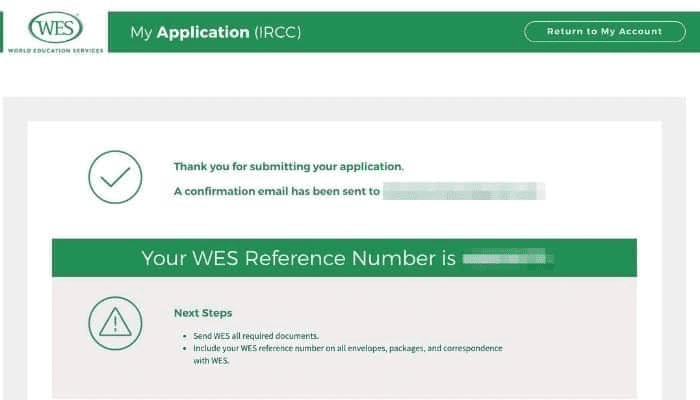
7. Upload Documents for WES Evaluation
Uploading a copy of my certificate for credential assessment in Canada was my first step. If you don’t need to, omit this step. You would need to upload it in the ‘My Accounts’ section for this.
Here are the guidelines before you upload.
-Upload only PDF or JPEG files. Do not password-protect your PDF.
-The maximum file size is 10 MB.
-You can upload a total of 20 files. Please consider combining several pages into one file if they are related.
-Only upload correct, clear, legible documents. Your documents cannot be deleted once they are uploaded.
-Do not upload academic transcripts or mark sheets, upload is available only for degree certificates and translations.
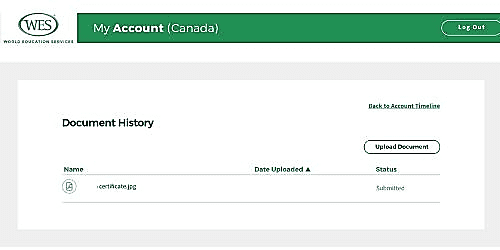
8. Transcript Submission WES Degree Evaluation
The tricky part comes at this point particularly if your university doesn’t have a way for you to ask them to send the transcripts or a way to send the documents electronically. Many universities don’t, particularly those in developing nations.
In this situation, you would therefore need to travel to your university or college, or both, fill out the necessary paperwork, obtain the necessary signatures, pay the associated costs, and perhaps even make some arrangements for the university to send the transcripts in a sealed envelope.
WES sealed envelope
A WES-sealed envelope appears as shown in the image. It should always include the official transcripts, the WES reference number, and your university’s return address.
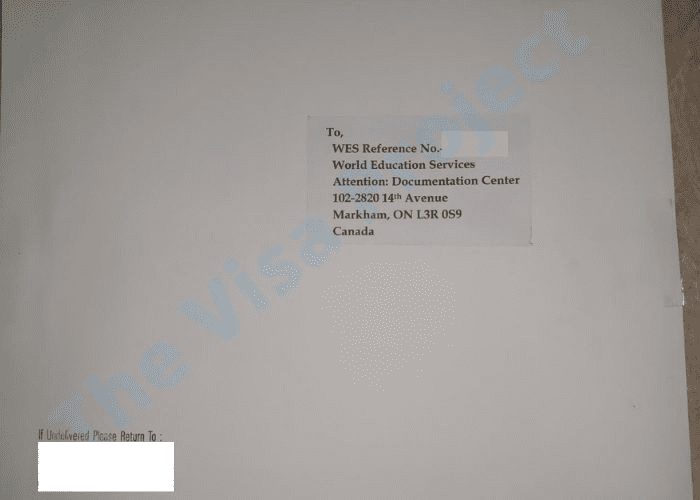
9. WES Receives Your Transcripts
The status of your application will change once WES receives your transcripts. Additionally, WES will send you an email regarding the same. I’ve attached the email I got from WES.
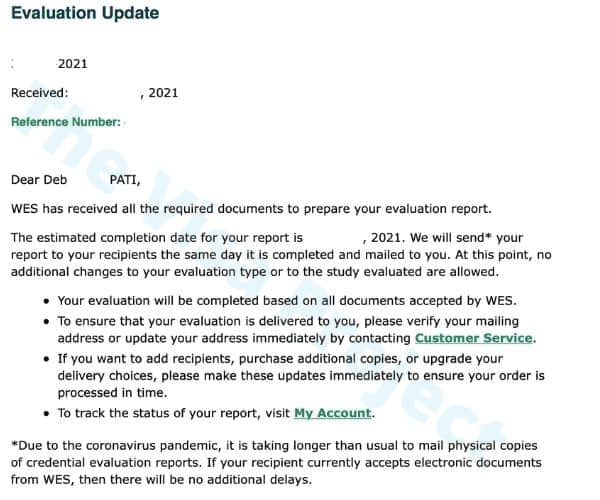
10. Receive the ECA from WES
You can view the results of the evaluation once it is finished in the WES portal.You could view the report electronically, download it, and receive notification that it has been sent to the IRCC. Here is my own.
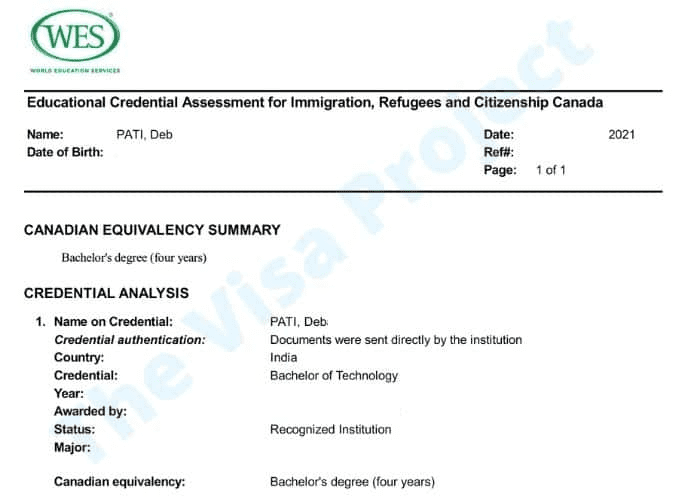
WES Address in Canada
When sending official transcripts, you or your educational institution will need the WES address in Canada. This is where to find it.
World Education Services
Attention: Documentation Center
102-2820 14th Avenue
Markham, ON L3R 0S9
Canada
When sending transcripts, be sure to include the WES Reference No. above the address.
Upgrading Your ECA for Canada
Your ECA could be upgraded to reflect a new degree. Therefore, you can upgrade your credentials assessment so that you receive the CRS points for the Master’s if, for instance, you had your bachelor’s degree evaluated and then, two years later, you completed a master’s degree.
You will have to pay more for this, and you or the university must send the new degree’s transcripts.
Understanding the ECA Report
ECAs can be interpreted fairly simply for some degrees and more difficult for others. I’ve discovered that the reports sometimes don’t give you a clear picture of what’s going on, especially with integrated courses and master’s programs.
Visit the ECA interpretation page on the official Canadian government website for the best interpretation of the report.
Check the Canadian equivalents and the points associated with them after selecting the points system as the comprehensive raking system.
Link: Click here
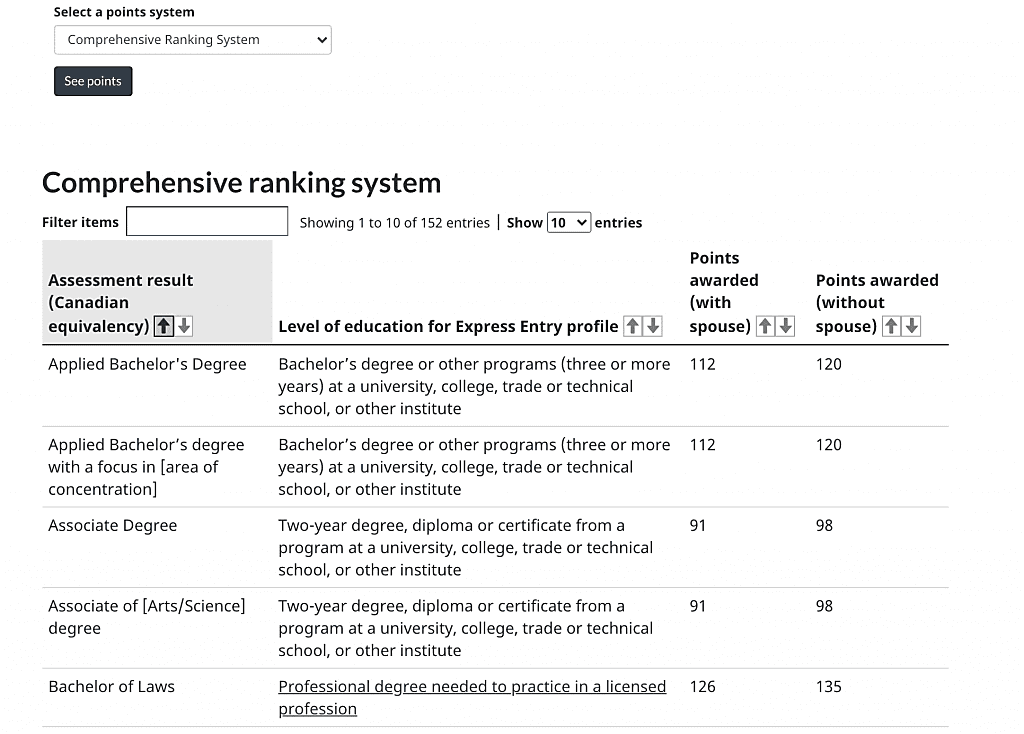
ECA for Cananda in India
There are a few things you need to think about if you plan to conduct ECA for Canada from India.Any Indian applicant sending in a master’s degree or postgraduate diploma must also send their bachelor’s degree in order to be evaluated.
Exceptions:
Indians who have earned a master’s degree in education, engineering, philosophy, or technology. Additionally, Ph.D. holders from India do not need to send their undergraduate or graduate degrees for evaluation.
Frequently Asked Questions: WES in Canada
In Canada, WES typically completes the credential assessment in 35 business days or less. And this comes after full payment, and all documents have been received, reviewed, and approved. The degree evaluation in Canada will take longer if more investigation, correspondence, or verification is needed. Despite this, people have also received it within a week or two.
ECA for Canada is valid for 5 years.
There are some circumstances where WES can reimburse your evaluation fees, particularly when they have not yet started the actual evaluation and have not gotten the transcripts from your university.
For illustration, suppose you paid for an MBA, thinking you would receive a Master’s equivalent. Then you understood that you would only receive a bachelor’s degree and that CES or IQAS would be more beneficial.
If WES has not yet received the transcripts, you may be eligible for a refund.
The evaluation is necessary if the applicant received their education outside of Canada to:
-Be eligible as the principal applicant for Federal Skilled Workers Program (Express Entry); OR
-Earn points for education received outside of Canada
The applicant may also receive points for their level of education if their spouse or common-law partner is also traveling to Canada with them.
The applicant must work with one of these authorized businesses:
-Comparative Education Service – University of Toronto School of Continuing Studies
-International Credential Assessment Service of Canada
-World Education Services
-International Qualifications Assessment Service
-International Credential Evaluation Service
Before an evaluation can be finished, payment must be received. Credit cards, checks/money orders, and Western Union transfers are all accepted by WES.
Applications for the IRCC must be processed within 35 business days.

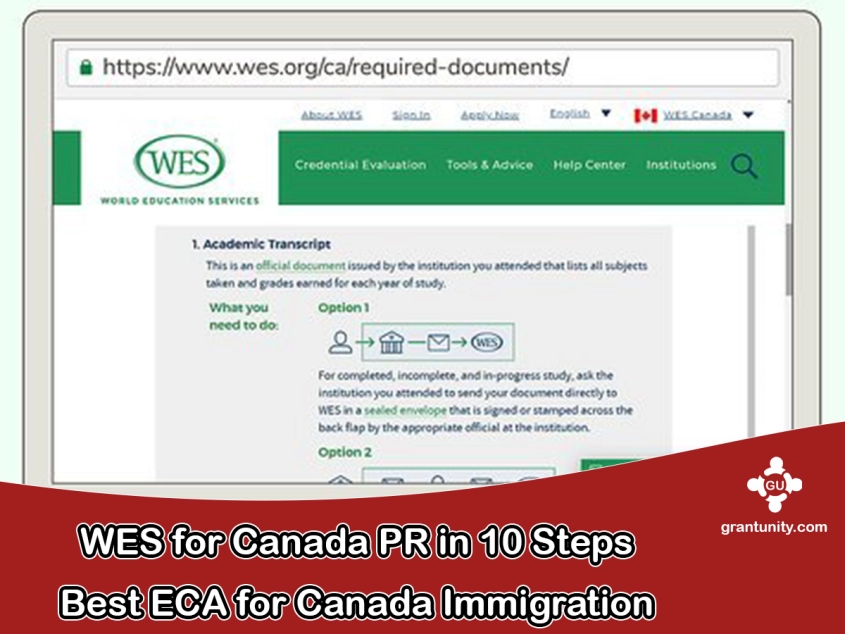

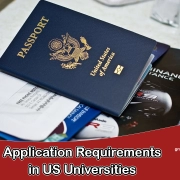




Leave a Reply
Want to join the discussion?Feel free to contribute!